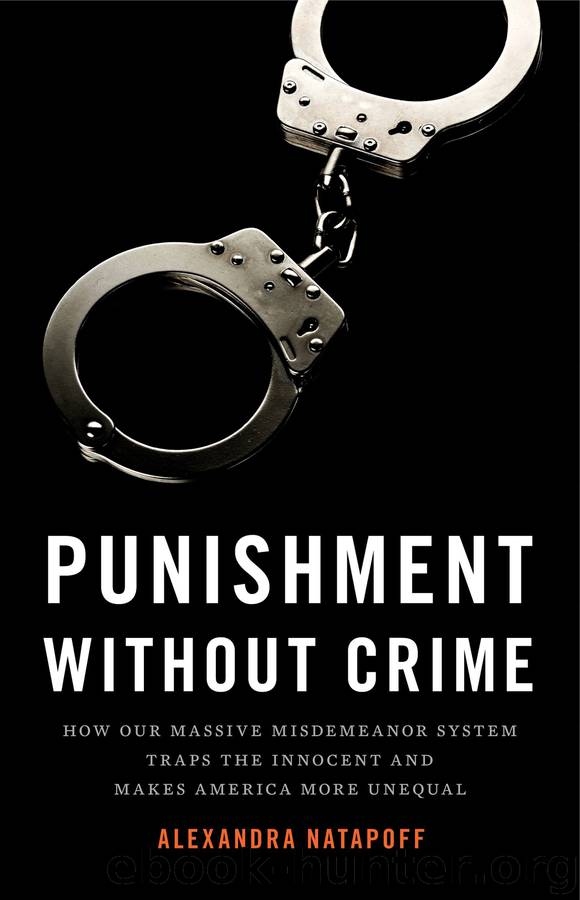Punishment Without Crime by Alexandra Natapoff

Author:Alexandra Natapoff
Language: eng
Format: epub
Publisher: Basic Books
Published: 2018-12-31T05:00:00+00:00
| 8 |
JUSTICE
HAVING CONFRONTED THE MISDEMEANOR PROCESS IN all its complexity, we now face foundational theoretical questions. What is the right way to run a low-level criminal system in a democracy? Our misdemeanor system is deeply flawed. What would make it fair, principled, and good, or at least good enough? Misdemeanors have largely escaped such scrutiny, slipping beneath the radar of big philosophical conversations about criminal justice and democratic principles. But the petty-offense process is too important and influential to be left out of such debates. It deserves to be brought into the theoretical fold, to take its place alongside other major public institutions and practices that are routinely subjected to sustained, principled analysis. This chapter is an effort to begin that process.
The good news is that there is no need to reinvent the wheel. We have been having rigorous conversations about justice for a long time, especially within criminal legal theory, in sociology, and in democratic theory. Together these three different perspectives offer a combination of basic principles, ways of asking about the fairness and legitimacy of major social institutions, through which we can evaluate the misdemeanor system as a legal and democratic phenomenon. They give us a vocabulary to explain more precisely why so many aspects of the petty-offense process seem unjust, in recognizable terms that have long been used to make such arguments. They also can help clarify more precisely where the petty-offense process offends basic precepts of law and democracy and where it is merely flawed in the all-too-common way of human institutions and around which it is the business of government to tinker.
Of course, these three approaches are not the only perspectives from which we could ask such questions. Economics and psychology, for example, offer important insights into the nature of criminal justice as well.1 But these three are the legs of the misdemeanor justice stool, as it were. Each one goes to a fundamental feature of the misdemeanor system. It is, first, a criminal system and therefore needs to comport with basic criminal legal principles. Second, it exerts an enormous amount of stratifying social control over the disadvantaged. This fact requires sustained attention of the kind that sociology provides. And third, because of these first two features, it is an integral, influential part of our larger democracy, which means that it should obey basic democratic principles. Whatever else it might include, any framework for misdemeanor justice will need to engage these sorts of legal, sociological, and democratic issues.
We start with the classic legal justifications for state punishment.2 We begin there in order to remind ourselves that the criminal system wields special authority, that it has a unique moral, normative heft, that through its coercive and stigmatic powers, it enables the government to turn millions of people into criminals. In addition to its many other costs, the sheer enormity of the American penal institution has normalized this singular function of the state. With millions of people in prison and jail, we have become numbed to
Download
This site does not store any files on its server. We only index and link to content provided by other sites. Please contact the content providers to delete copyright contents if any and email us, we'll remove relevant links or contents immediately.
| General | Discrimination & Racism |
Nudge - Improving Decisions about Health, Wealth, and Happiness by Thaler Sunstein(7707)
The Fire Next Time by James Baldwin(5446)
iGen by Jean M. Twenge(5416)
Adulting by Kelly Williams Brown(4574)
The Sports Rules Book by Human Kinetics(4388)
The Hacking of the American Mind by Robert H. Lustig(4383)
The Ethical Slut by Janet W. Hardy(4253)
Captivate by Vanessa Van Edwards(3840)
Mummy Knew by Lisa James(3693)
In a Sunburned Country by Bill Bryson(3542)
The Worm at the Core by Sheldon Solomon(3487)
Ants Among Elephants by Sujatha Gidla(3467)
The 48 laws of power by Robert Greene & Joost Elffers(3291)
Suicide: A Study in Sociology by Emile Durkheim(3023)
The Slow Fix: Solve Problems, Work Smarter, and Live Better In a World Addicted to Speed by Carl Honore(3009)
The Tipping Point by Malcolm Gladwell(2924)
Humans of New York by Brandon Stanton(2873)
Get What's Yours for Medicare: Maximize Your Coverage, Minimize Your Costs by Philip Moeller(2734)
Handbook of Forensic Sociology and Psychology by Stephen J. Morewitz & Mark L. Goldstein(2705)
